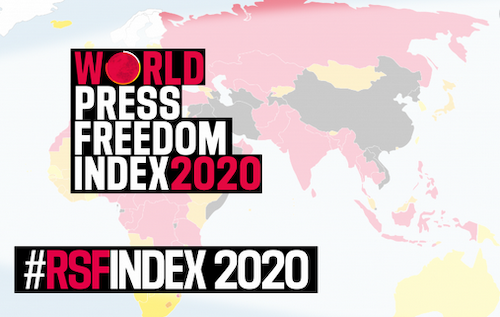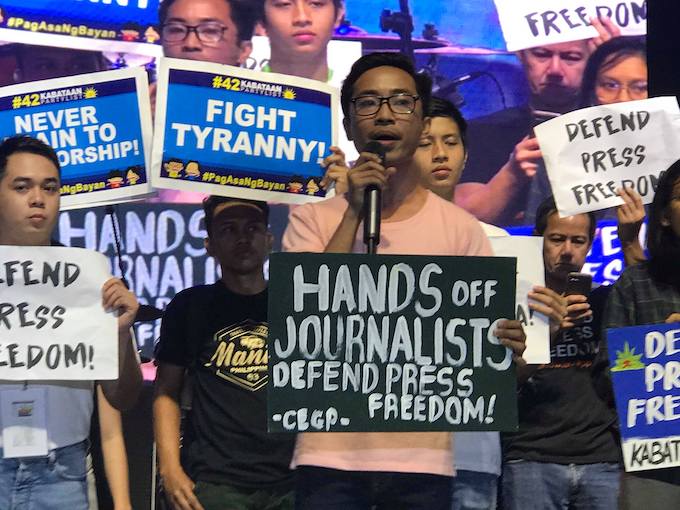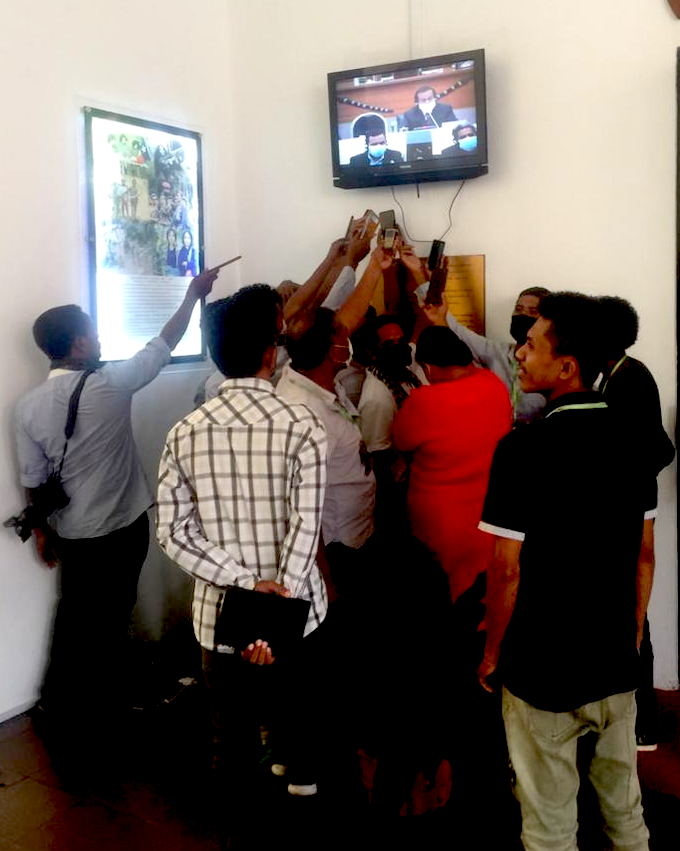Reporters Without Borders has just published its annual World Press Freedom Index ranking countries over censorship. Video: Hannah Cleaver/DW
PACIFIC PANDEMIC DIARY: By David Robie, self-isolating in Auckland under New Zealand’s Covid-19 lockdown as part of a Pacific Media Watch series.
Against a backdrop of many governments using tough controls under cover of fighting the covid-19 coronavirus pandemic to strengthen “creeping authoritarianism”, a global media freedom watchdog has signalled draconian virus reactions as a major threat.
From Papua New Guinea where media briefings have been curtailed with a lockdown of the national information and operations “nerve centre” at Morauta Haus, to Fiji where media personalities have been arrested, to the Philippines where state troll armies “weaponise” disinformation on social media, and to Indonesia where street artists have stepped in fill an information void, the signs are really worrying for defenders for media freedom.
The pandemic is “highlighting and amplifying the many crises”, already casting a shadow on press freedom, says the Paris-based Reporters Without Borders watchdog, which released its annual World Media Freedom Index this week.
READ MORE: The Reporters Without Borders 2020 World Press Freedom Index

While China and Iran have been singled out for strong criticism for suppressing details of the coronavirus outbreak early in the crisis, several countries traditionally strong on media freedom in the Asia-Pacific region have slipped down in the rankings – including Australia, New Zealand and Papua New Guinea.
In the case of New Zealand, which has usually been in the top 10 of media freedom nations, it has dropped two places to ninth, mostly because of shrinking media plurality.
Only Timor-Leste made gains in regional media freedom, with Fiji and Samoa barely holding the line.
According to RSF secretary-general Christophe Deloire, the pandemic has encouraged some regimes to “take advantage of the fact people are stunned and mobilisation has weakened to impose measures that would be impossible to adopt in normal times”.
RSF accused China and Iran – in 177th, three places from the bottom of the 180-nation list, and 173nd place respectively – of censoring major coronavirus outbreaks.
Few rankings changed dramatically from last year, with Scandinavian countries again doing really well. Norway was top for the fourth year in a row with Finland again in second place.
Rounding off the bottom nations, unsurprisingly, were Turkmenistan and North Korea.
‘Information hyper-control’

RSF says China “maintains its system of information hyper-control, whose negative effects for the entire world have been seen during the coronavirus public health crisis”.
However, Europe has also not been immune with countries such as France (34th) – suffering violence against journalists in state crackdowns – and the United Kingdom (35th) also slipping.
Hungary (89th) has been criticised too over Prime Minister Viktor Orban’s widely condemned law on false information which was a “completely disproportionate and coercive measure”.
According to RSF, there is a “clear correlation” between suppression of media freedom in response to the coronavirus pandemic and a country’s ranking in the index.
The watchdog’s Asia-Pacific director, Daniel Bastard, says this year’s Index shows that press freedom is potentially in danger in any country. He adds that the region has shown the highest increase of violations (up 1.7 percent).
“The proof is Australia (26th), formerly cited as a regional model, which has fallen five places – above all because of federal police raids on a journalist’s home and the state TV broadcaster’s headquarters last year,” says Bastard.
“The precedent set by the raids poses a serious threat to investigative reporting and the confidentiality of journalists’ sources.
Constitution lacking guarantees
“It also drew Australians’ attention to the fact that their constitution is completely lacking in guarantees for the right to inform and to be informed.”
Bastard says the report shows that “business imperatives also threaten media independence” through encouraging an “extreme polarisation and search for sensationalism” – as with Tonga (down 5 at 50th), Papua New Guinea (down 8 at 46th), one place below the United States, and Taiwan (down 1 at 43rd).
“Even the regional model, New Zealand (9th), has fallen two places because media ownership continues to be highly concentrated,” says Bastard.
“It shows that regardless of where in the world you want to exercise the right to press freedom, you have to keep fighting for it.”
In the Philippines (136th), after a decade-long wait, leading members of the Ampatuan political clan were finally convicted in December 2019 of carrying out the biggest ever massacre of journalists, in which 32 journalists, many of them women, were killed on the island of Mindanao in 2009 and dumped in a mass burial site.
President Rodrigo Duterte’s government employs an army of trolls to attack media critics and has mounted a relentless campaign against some media companies.

A quick snapshot of selected Asia-Pacific nations in the Index report:
Australia 26th (down 5 places)
“In 2019, Australian journalists became more aware than ever of the fragility of press freedom in their country, whose constitutional law contains no press freedom guarantees and recognizes no more than an ‘implied freedom of political communication’. Federal police raids in June 2019 on the home of a Canberra-based political reporter and the headquarters of the state-owned Australian Broadcasting Corporation in Sydney were flagrant violations of the confidentiality of journalists’ sources and public interest journalism. ‘National security’, the grounds given for these raids, is used to intimidate investigative reporters. They also have to cope with a 2018 defamation law that is one of the harshest of its kind in a liberal democracy.”
Fiji 52nd (no change)
“Under Voreqe ‘Frank’ Bainimarama, who has proved impossible to remove as prime minister ever since a military coup in 2006, journalists who are overly critical of the government are often subjected to intimidation or even imprisonment. The media have to operate under the draconian 2010 Media Industry Development Decree, which was turned into a law in 2018, and under the regulator it created, the Media Industry Development Authority, over which the government has direct oversight. Those who violate this law’s vaguely worded provisions face up to two years in prison. The sedition laws … are also used to foster a climate of fear and self-censorship. Sedition charges put the lives of three journalists with The Fiji Times, the leading daily, on hold until they were finally acquitted in 2018. Many observers believe it was the price the newspaper paid for its independence.”
New Zealand 9th (down 2)
“The press is free in New Zealand but its independence and pluralism are often undermined by the profit imperative of media groups trying to cut costs to the detriment of good journalism. Concern was voiced about the editorial integrity at New Zealand’s leading news portal Stuff after its owner, Fairfax Media, was taken over by the Australian entertainment giant Nine Television Network in July 2018. Stuff was forced to close a third of the sites it hosted and major budget cuts were imposed on all the local media outlets it owns. The situation could have been even worse if the Commerce Commission had not blocked another proposed merger between Stuff and New Zealand Media and Entertainment (NZME), which owns the country’s leading daily, The New Zealand Herald.”
Papua New Guinea 46th (down 8)
“Although the media enjoy a relatively benign legislative environment, their independence is clearly endangered. The last months of the government led by Peter O’Neill, a prime minister with dictatorial tendencies, were marked by many press freedom violations, including intimidation, direct threats, censorship, prosecutions and attempts to bribe journalists. The installation of an O’Neill rival, James Marape, as prime minister in May 2019 was seen as an encouraging development for the prospects of greater media independence vis-à-vis the executive.
“Journalists nonetheless continue to be dependent on the concerns of those who own their media. This is particularly the case at the two main dailies, The Post-Courier, owned by Australian media tycoon Rupert Murdoch’s News Corp, and The National, owned by the Malaysian logging multinational Rimbunan Hijau, which does not want its journalists to take too much interest in environmental issues.”
Samoa 22nd (down 1)
“Despite the liveliness of media groups such as Talamua Media and the Samoa Observer group, this Pacific archipelago is in the process of losing its status as a regional press freedom model. A law criminalising defamation was repealed in 2013, raising hopes that were dashed in December 2017, when Parliament restored the law under pressure from Prime Minister Tuilaepa Sailele Malielegaoi so that that he could attack journalists who dared to criticise members of his government. … In response to … repeated threats, the Samoa Alliance of Media Practitioners for Development (SAMPOD) urged the media to reaffirm the right of Samoans to pluralist, free and independent journalism as an essential condition for democracy.”
Timor-Leste 78th (up 6)
“No journalist has ever been jailed in connection with their work in East Timor since this country of just 1.2 million inhabitants won independence in 2002. Articles 40 and 41 of its constitution guarantee free speech and media freedom. But various forms of pressure are used to prevent journalists from working freely, including legal proceedings designed to intimidate, police violence and public denigration of media outlets by government officials or parliamentarians. The creation of a Press Council in 2015 was a step in the right direction, despite the reservations expressed by the media about the way its members are elected.
“However, the media law adopted in 2014, in defiance of the international community’s warnings, poses a permanent threat to journalists and encourages self-censorship. Relatively unrestricted coverage of government instability in 2019-20 nonetheless served to show the importance of the role that media pluralism can play in East Timor’s democracy.”
Tonga 50th (down 5)
“Independent media outlets have increasingly assumed a watchdog role since the first democratic elections in 2010. However, politicians have not hesitated to sue media outlets, exposing them to the risk of heavy damages awards…. The re-election of [the late] Prime Minister Samuela ‘Akilisi Pōhiva’s party in November 2017 was accompanied by growing tension between the government and journalists. This was particularly so at the state radio and TV broadcaster, the Tonga Broadcasting Commission (TBC), where two senior editors were sidelined under pressure from the government. Pohiva Tu’i’onetoa, who became prime minister in October 2019, must put a stop to the pressure and meddling and ensure that journalists enjoy full editorial independence.”
Not all Pacific nations are surveyed by the Index. At least Vanuatu should be there and West Papua is “hidden” within the Indonesian (119th) statistics.
A final word on the status of Timor-Leste. The country has a dynamic young media industry with a group of dedicated and creative journalists and industry leaders. In many respects they are showing the way to their more established Pacific neighbours and this ought to be reflected with a higher ranking.
Perhaps next year if the media freedom improvements keep coming?

Pacific Media Watch collaborates with Reporters Without Borders.













































